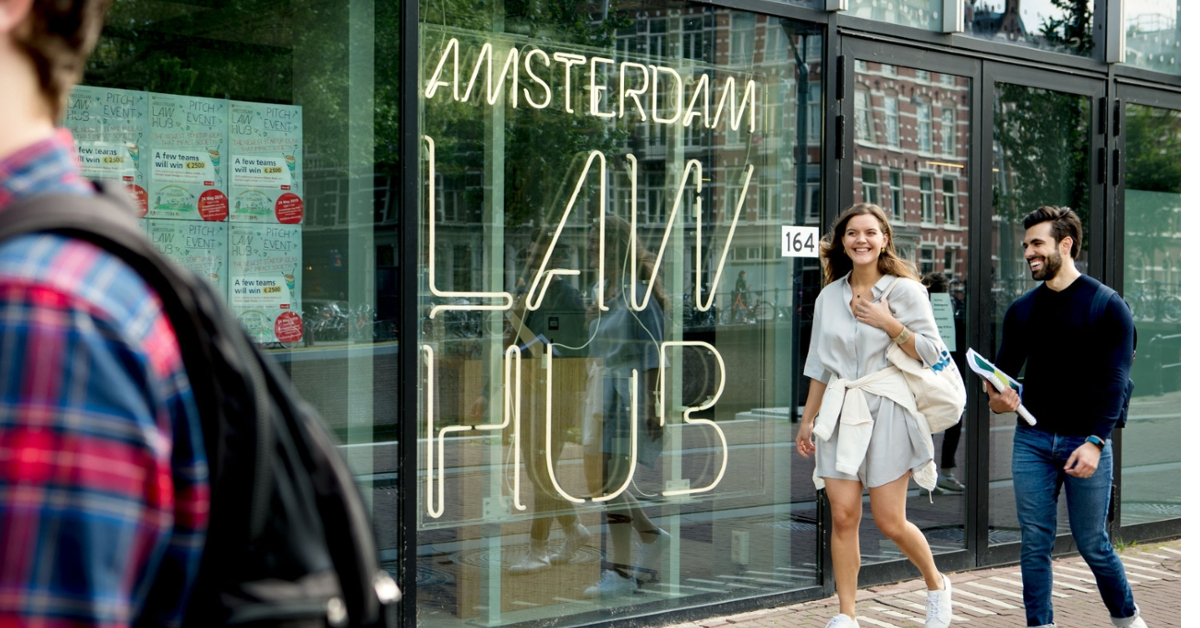Image credits: Amsterdam Law Hub
There is a quiet shift happening in the legal sector in the Netherlands, thanks to digitisation and technological developments. A lot of legal tech startups are taking on the audacious goal of transforming the future of law and justice. However, not every startup succeeds in this pursuit due to a variety of reasons. This is where The Amsterdam Law Hub tries to fill the gap by supporting innovative solutions within the legal and judicial sector.
A couple of months back, The Law Hub launched a new fund to support startups or foundations that solve judicial problems. Recently, The Amsterdam Law Hub has announced its first legal start-up event, in collaboration with StartupAmsterdam, on June 3rd, 2021. During the event, the University of Amsterdam (UvA) students will pitch their business ideas to a wider audience within the legal tech industry.
Here are the ten top international startups shortlisted for the 2021 Future Hamburg Award
Talking about the event, Nathalie Dijkman, Director at Amsterdam Law Hub, in an exclusive interview with Silicon Canals, says, “We are just finalising our first Justice Entrepreneurship course with LLM students of the University of Amsterdam. With 14 entrepreneurial law (master) students, seven products/solutions (MVPs) were developed in a period of 8 weeks. We want to showcase these new solutions and inspire our justice entrepreneurs by bringing together a network of legal tech startups and innovators in The Netherlands. Due to COVID, the Dutch legal tech community was not able to network as much as usual. We feel now is the right time to engage everyone again and connect them to our space at the Amsterdam Law Hub.”
Besides, there will be an opportunity to speed-date with relevant parties from both our network and StartupAmsterdam. The jury will decide which team wins the €500 prize to invest in the company.
Why The Amsterdam Law Hub?
The Amsterdam Law Hub is on a mission to support and work with researchers and students to develop innovative solutions within the judicial and legal sectors.
Talking about establishing The Amsterdam Law Hub, Dijkman, shares, “We felt a breeding ground for legal innovation in The Netherlands was missing. Where are legal tech start-ups supposed to come from? There are a few players interested in successful legal start-ups, but legal entrepreneurs first need a safe space to test their ideas and grow them to that stage. What better place to start than at the Law School, where students should be learning about the role of technology in affecting the sector. So from the ecosystem perspective: the University is the best place to nourish talent to develop new solutions. Universities, by nature specialising in research and innovation, should be supporting future legal innovators.”
She continues, “With regards to what society needs in terms of legal tech: solutions that don’t only support corporations but also societal goals. There’s a lack of innovation funnelling going to solving the biggest problems in the legal space: access to justice to those who can’t afford a Zuidas lawyer. Many disputes go unresolved because of this, and this is also costing society money. We jumped into that gap.”
Challenges
Numerous companies are cropping up in the legal market, but these startups face challenges right from getting access to capital to winning the trust of the users.
“I know from the start-ups we help at the Law Hub that the major problems they face are (a) access to finance for early-stage start-ups (b) challenges of adoption by established legal partners and government entities because it’s a very conservative sector and they usually have their in-house innovation teams and are not very keen to work with young start-ups (c) winning the trust of users in moving to online/automated legal advice if they are used to having a lawyer guiding them,” Dijkman opines.
Overcoming hurdles
To help these initial hurdles, Amsterdam Law Hub offers a loan or investment of €2,500 to get started on a variety of things; from testing your marketing strategy, to building a tool, to designing a website. Right now, the Legal Start-up Fund is open to teams that have (at least) one student or researcher connected to the University of Amsterdam.
Dijkman, on helping startups tackling other challenges, notes, “When it comes to challenges for adoption by bigger partners, we do our best to establish partnerships with them and use our University brand and network to give more legitimacy to the startup when pitching their solutions to these partners. This has helped in a few cases in our portfolio, where the right introductions were made.”
“Then finally, winning the trust of users is something we tackle by applying a human-centred design approach when coaching them throughout their pilot phase. We make sure the tools and services that are developed are constantly adapted to what people are comfortable with and need. As such, we gain trust by including our users in every phase of building new legal tech solutions, even before the first MVP is built,” she adds.
Future plans
Following the positive growth in 2020, Amsterdam Law Hub is up for some challenges in 2021. The Law Hub will be hosting four workshops this year to improve on skills for researchers, a ‘three-minute thesis competition’ for all UvA faculties, among others.
“We aim to build on the existing community of legal innovators in The Netherlands by adding in the Amsterdam Law School’s talent and research. We want to create a new pipeline for legal tech investors and incubators. And, importantly, we want to contribute to solving (access to)
justice problems in society through technology and human-centred design. We, therefore, aim to create a bridge between academia and society to solve problems in the legal sector.” concludes Dijkman.
To get an idea about the programme here’s the schedule:
- 11:00-11:15 Introduction
- 11:15-12:45 Q&A sessions & workshops met themas van Access to Justice en Legal Technology
- 12:45-13:15 Online Speed Networking Lunch
- 15:00-17:00 Pitches & Award Ceremony (LIVESTREAM)
Here’s how to build one that doesn’t, according to this expert…









